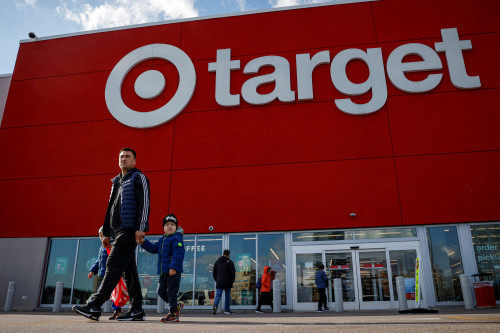By Siddharth Cavale, Ananya Mariam Rajesh
(Reuters) -Target slashed its annual sales forecast on Wednesday, after a surprisingly sharp fall in quarterly same-store sales, as customers pulled back on discretionary purchases due to ongoing worries about inflation and the economy due to U.S. President Donald Trump’s trade war.
Target also said its first-quarter performance was affected by negative reactions to its pullback on diversity, equity and inclusion policies (DEI) in January, which angered some loyal customers who have long praised the company’s commitment to inclusiveness.
Shares of the company fell 4% in afternoon trading, continuing a run of weakness. In the last 12 months, the stock has lost 40% of its value, while Costco shares have gained 30% and Walmart shares have doubled.
Target has struggled with merchandise missteps, retail crime, and inventory management. Over the past year it has faced challenges in maintaining steady sales growth, dealt with boycotts and lawsuits related to its DEI practices and relied heavily on sourcing from countries where Donald Trump has placed broad-based tariffs.
“Target’s (results) do nothing to restore confidence in the company. On the contrary, they are emblematic of a business that has made too many mistakes and has lost its way on several fronts,” GlobalData managing director Neil Saunders said.
Target said Wednesday it now expects a low-single digit decline in annual sales, a surprise for Wall Street analysts, who expected a 0.27% rise, according to LSEG. Target previously forecast net sales growth of around 1%.
The big-box retailer’s results showcase the pressure American consumers are under. In May, consumer sentiment slumped further while one-year inflation expectations surged. Still, Target’s forecast contrasts with bigger rival Walmart, which maintained its annual forecasts last week but said it would need to pass on higher prices due to tariffs. That drew the ire of President Donald Trump, who said Walmart should “eat the tariffs” on imported goods.
On a media call, Target executives declined to provide details on potential price increases due to tariffs. Most tariff-related increases could be offset, they said, but acknowledged that raising prices could be a “last resort.”
CEO Brian Cornell said pricing decisions will largely depend on ongoing efforts to source more products in the United States and reduce reliance on China.
Rick Gomez, the company’s chief commercial officer, said Target is working on negotiating with suppliers, expanding sourcing to other Asian countries beyond China, re-evaluating its product assortment, and adjusting the timing and quantity of orders, which should offset the majority of its exposure to tariffs.
In January, Target ended many of its DEI policies, drawing significant criticism, with some noting that its focus on inclusiveness helped attract younger, more diverse consumers. The decision generated more attention as it coincided with President Trump’s executive order to eliminate DEI policies in federal agencies and schools.
The backlash led to economic boycotts, notably from Reverend Jamal-Harrison Bryant, a Georgia pastor who organized a 40-day “fast” of Target stores earlier this year. He has called for those efforts to continue in recognition of the fifth anniversary of George Floyd’s murder in Minneapolis, Target’s headquarters.
CEO Cornell said the reversal of some DEI policies played a role in first-quarter performance, but that he couldn’t quantify the impact.
CHINA EXPOSURE
Target’s first-quarter comparable sales fell 3.8%, compared to analysts’ estimates of a 1.08% decline. On an adjusted basis, Target reported $1.30 per share. Analysts on average were expecting $1.61 per share.
“Expectations were very low for Target’s first quarter. Even against that, Target’s results came in light,” Michael Baker, a D.A. Davidson analyst.
Unlike Walmart, which generates the bulk of its revenue selling grocery items like bananas, milk, toilet paper, and shampoo, a majority of what Target sells falls in the non-essential category – largely apparel, home furnishing and beauty products, which it sources from China.
Target has said it depends on China for 30% of its store-label goods and that it is on track to reduce that to less than 25% by the end of the year. This is down from 60% in 2017, but still makes the current 30% tariff on China imports hard to navigate, analysts have said.
It expects annual adjusted earnings between $7.00 and $9.00 per share, compared to its prior forecast of $8.80 to $9.80.
(Reporting by Siddharth Cavale in New York and Ananya Mariam Rajesh in Bengaluru, Editing by Nick Zieminski)


